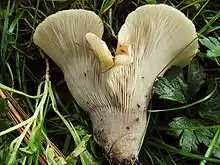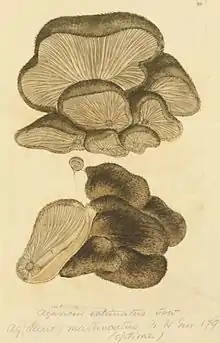Hohenbuehelia
Hohenbuehelia is a pleurotoid genus of agaric fungi characterized by gelatinous-sheathed bowling-pin-shaped cystidia, on conidia, basidiospore germ tubes, and mycelium that adhere to and capture nematodes. The fruitbodies bear thick-walled cystidia (metuloids) in the hymenium along the gill sides and that differentiate the genus from Pleurotus in the Pleurotaceae family. The genus has a widespread distribution and contains about 50 species.[1][2]
| Hohenbuehelia | |
|---|---|
 | |
| Hohenbuehelia petaloides | |
| Scientific classification | |
| Kingdom: | |
| Division: | |
| Class: | |
| Order: | |
| Family: | |
| Genus: | Hohenbuehelia Schulzer (1866) |
| Type species | |
| Hohenbuehelia petaloides (Bull.) Schulzer | |
Etymology
Named after — Ludwig Samuel Joseph David Alexander Freiherr von Hohenbühel Heufler zu Rasen und Perdonegg (1817-1885) - an Austrian baron and cryptogamist.[3]
Species

Hohenbuehelia mastrucata
- H. abietina
- H. aciculospora
- H. amazonica
- H. angustata
- H. approximans
- H. atrocoerulea
- H. aurantiocystis
- H. auriscalpium
- H. austrocedri
- H. barbatula
- H. brunnea
- H. campinaranae
- H. culmicola
- H. cyphelliformis
- H. delasotae
- H. elegans
- H. espeletiae
- H. fluxilis
- H. grisea
- H. heterosporica
- H. horakii
- H. hydrogeton
- H. inversa
- H. izonetae
- H. leightonii
- H. ligulata
- H. longipes
- H. luteola
- H. mastrucata
- H. metuloidea
- H. minutissima
- H. mustialaensis
- H. myxotricha
- H. nigra
- H. nothofaginea
- H. panelloides
- H. pergelatinosa
- H. petalodes
- H. petaloides
- H. phalligera
- H. pinacearum
- H. pinicola
- H. podocarpinea
- H. recedens
- H. reniformis
- H. sciadia
- H. silvana
- H. testudo
- H. tremula
- H. tropicalis
- H. unguicularis
References
- Thorn RG. (2013). "Nomenclatural novelties" (PDF). Index Fungorum. 16: 1–2.
- Kirk PM, Cannon PF, Minter DW, Stalpers JA (2008). Dictionary of the Fungi (10th ed.). Wallingford: CABI. p. 319. ISBN 978-0-85199-826-8.
- Burkhardt, Lotte (2022). Eine Enzyklopädie zu eponymischen Pflanzennamen [Encyclopedia of eponymic plant names] (pdf) (in German). Berlin: Botanic Garden and Botanical Museum, Freie Universität Berlin. doi:10.3372/epolist2022. ISBN 978-3-946292-41-8. S2CID 246307410. Retrieved January 27, 2022.
External links
- G. Barron`& Hohenbuehelia nematode traps
- Tom Volk & Hohenbuehelia'
- "Hohenbuehelia Schulzer". Atlas of Living Australia.
This article is issued from Wikipedia. The text is licensed under Creative Commons - Attribution - Sharealike. Additional terms may apply for the media files.